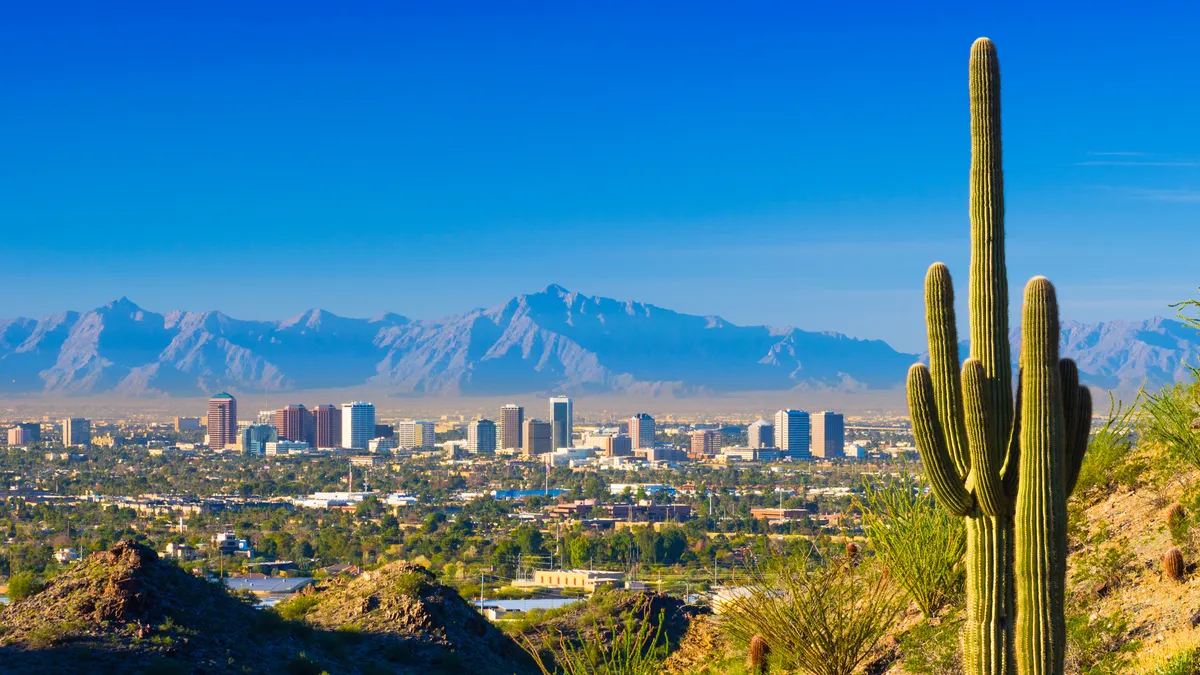Dive Brief:
- The Phoenix City Council last week unanimously approved a water conservation policy that targets future development, as communities in the West grapple with a years-long drought and a shrinking Colorado River.
- The policy places restrictions on prospective users of large amounts of water, directs the city to develop best management practices for water conservation in new development and pauses the expansion of most water services beyond current city limits as long as water supplies are stressed.
- While Southwestern cities vary in their approaches to water conservation, from regulations to incentives, Phoenix’s new policy charts a middle path, somewhat uniquely putting the onus on future planning, said Max Wilson, deputy director of the Phoenix Water Services Department’s water planning division.
Dive Insight:
Water security is “the cornerstone of sustainability in desert cities,” according to the text of the resolution Phoenix passed last week. The area’s water security is at risk, however, as the Colorado River’s water supply dwindles after years of overallocation, climate change impacts and prolonged drought.
The Phoenix area made national headlines earlier this month after state officials announced that, due to groundwater shortage concerns, Arizona will limit certain new housing construction. However, the fast-growing city of Phoenix itself relies very little on groundwater — it’s about 2% of the city’s water supply, said Cynthia Campbell, the city’s water resource management advisor, in the June 13 City Council meeting where the new water conservation policy was adopted.
When evaluating rezoning cases, the City Council will consider the water conservation best management practices called for by the new policy. For example, if a developer wants to build more units on a parcel than it’s currently zoned for, it may be allowed to do so if it takes certain water-efficiency measures the city has deemed best management practices, Wilson said.
The best management practices will also inform updates to the city’s building code, zoning ordinances and drainage design manual.
The new policy also requires prospective users of large amounts of water to submit a water conservation plan for city approval. There are currently about 20 such large water users in Phoenix, Wilson said.
“What’s challenging ... is that it’s a very diverse group of folks,” Wilson said in an interview. “It’s some school districts, not all; some hospitals, not all; some homeowners associations, not all.” That’s why the city is not taking a one-size-fits-all approach, he said, and is instead allowing users to come up with their own plans regarding their use and conservation of water.
When evaluating those plans, the city will take into consideration whether the project is a key industry that will benefit Phoenix’s economy, the economic value and impact of the proposed water use and the impact on water rates. The city may decide a project isn’t compatible with available water resources, consistent with planning documents or has enough economic benefit to merit the large water use.
The city should also have these conversations with existing users of large amounts of water, Councilmember Betty Guardado said in the June 13 meeting.
Vice Mayor Yassamin Ansari urged the city to limit expansion outward and prioritize dense infill development. “Infill is much more water efficient, much more energy efficient, it helps, obviously, [to] reduce our reliance on cars as well,” she said at the meeting.












